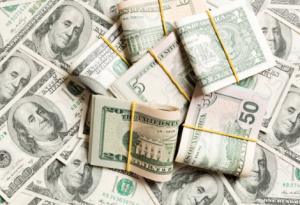On Friday, August 12, 2022, House Democrats approved their largest ever tax, health, and climate bill, the “Inflation Reduction Act”, which will raise taxes on the middle class and make inflation worse. It will now be sent to President Joe Biden’s desk.
The bill’s passage came at a time when Inflation rates are still at a 40-year high, despite Joe Biden’s claim of “0% inflation” in July. It also came nearly just a week after Vice President Kamala Harris cast the tie-breaking vote in the Senate.
In a 220-to-207 vote, every single Democrat voted in support of passing the “Inflation Reduction Act.” Republicans strongly opposed it.
Democrats flouted their success as representing a so-called big win for Biden, just as Americans were giving up hope and just in time for the upcoming November midterm elections.
According to House Speaker Nancy Pelosi (D-Calif), “the $740 billion legislation is said to “save the planet while keeping more money in your pockets.” However, several Republicans argued that it will only drive inflation up and put new burdens on Americans.
House Minority Whip Steve Scalise (R-La) had no kind words to say about the bill, describing it as “the Inflation, Recession, and IRS Army Act.”
House Minority Leader Kevin McCarthy (R-Calif) further slammed the House for approving the bill, calling it a “misguided, tone-dead bill.”
Energy security and climate change programs
The 730-page spending package, calling for $437 billion in estimated new spending, will supposedly give an estimated $369 billion to energy security and climate change programs, including efforts to reduce greenhouse gas emissions by about 40% of 2005 levels before the year 2030. Might the $369 billion be just one big Marxist slush fund? You be the judge.
Included are the following items:
- $7,500 tax credits for buyers of new electric cars and $4,000 for used models
- $62 billion for initiatives to support domestic manufacturing of solar panels, wind turbines, batteries, electric cars and the processing of rare minerals
- $30 billion in grants and loans for states and electric companies to transition away from fossil fuels
- $27 billion for Greenhouse Gas Reduction Fund “climate bank” managed by the Environmental Protection Agency to invest in green-energy companies
- $20 billion for the Department of Agriculture’s Natural Resources Conservation Service to promote “climate-smart” farming
- $10 billion to improve energy efficiency in lower-income homes
- $9 billion for federal procurement of “clean technologies” including $3 billion for the US Postal Service electric vehicles
- $6 billion for the new Advanced Industrial Facilities Deployment Program to reduce emissions at chemical, steel and cement plants
- $3 billion for the Environmental and Climate Justice Block Grants program to back “community-led” programs in “disadvantaged” areas
- $3 billion for Neighborhood Access and Equity Grants to “support neighborhood equity, safety, and affordable transportation access”
- $3 billion for zero-emission equipment and technology at ports
- $1.5 billion to plant trees and expand urban green space’$4 billion for Western wildfire resilience, added at the request of Senator Sen. Kyrsten Sinema (D-Ariz.) a key vote for passage.
The legislation also extends through 2025 more generous COVID-19-era Obamacare subsidies. People earning up to 150% of the federal poverty level can get health insurance for $0 through Obamacare exchanges. Higher earners can get coverage for 8.5% of their income.
The legislation further imposes a $35 cap on out-of-pocket insulin costs for Medicare patients.
Tax Hikes in Democrat’s inflationary tax and spend bill
$6.5 Billion Natural Gas Tax Which Will Increase Household Energy Bills
The Congressional Budget Office estimates the natural gas tax will increase taxes by $6.5 billion.
The tax hike violates President Biden’s tax pledge to any American making less than $400,000 per year. Biden administration officials have repeatedly admitted taxes that raise consumer energy prices are in violation of President Biden’s $400,000 tax pledge.
$12 Billion Crude Oil Tax Which Will Increase Household Costs
Democrats have included a 16.4 cents-per-barrel tax on crude oil and imported petroleum products that will be passed on to consumers in the form of higher gas prices.
‘The non-partisan Joint Committee on Taxation (JCT) estimates the provision will raise $12 billion in taxes.
$1.2 Billion Coal Tax Which Will Increase Household Energy Bills
The bill would more than double current excise taxes on coal production.
JCT estimates that this will raise $1.2 billion in taxes that will be passed on to consumers in the form of higher electricity bills.
$225 Billion Corporate Income Tax Hike Which Will Be Passed on to Households
The cost of this tax increase will be borne by working families in the form of higher prices, fewer jobs, and lower wages.
Preliminary cost estimates from the Congressional Budget Office found the provision would increase taxes by more than $225 billion.
According to JCT’s analysis, 49.7 percent of the tax would be borne by the manufacturing industry at a time when manufacturers are already struggling with supply-chain disruptions.
Tax Foundation also warned that current supply chain issues could be worsened by the book tax’s disproportionate burden on key industries.
$74 Billion Stock Tax Which Will Hit Your Nest Egg — 401(k)s, IRAs, and Pension Plans
When Americans choose to sell shares of stock back to a company, Democrats will impose a new federal excise tax which will reduce the value of household nest eggs.
When companies perform stock buybacks, these investors are the ones who benefit. A tax on buybacks could dissuade companies from conducting this action and negatively impact retirement savings.
Union retirement plans will also be hit.
95% Federal Excise Tax on American Pharmaceutical Manufacturers
Democrats would impose a 95 percent excise tax on prescription drugs unless drug manufacturers accept government price controls.
In reality, all drug manufacturers would accept the price controls or stop selling the drug in the U.S. market entirely rather than pay the 95 percent tax.
This provision would restrict U.S. medical innovation and limit the supply of new medicines.
CBO warned the reduction in manufacturers’ revenue could be as high as $1 trillion over the next ten years and would “lower spending on research and development and thus reduce the introduction of new drugs.”
$52 Billion Income Tax Hike on Mid-Sized & Family Businesses
This provision would raise taxes on a manufacturer, retailer or other capital-intensive business that sees significant business losses in any year due to the cost of wages, rent, new equipment, inventory, and interest payments.
Preliminary cost estimates from the Joint Committee on Taxation show the provision will increase taxes by $52 billion.
This provision violates President Biden’s campaign pledge to small businesses: “Taxes on small businesses won’t go up.”
Supersizing the IRS to Increase Audits – $204 Billion
The bill would spend $80 billion to supersize IRS with 87,000 new agents and auditors and ramp up audits on working households and small businesses. The IRS would perform an additional 1.2 million annual audits under the plan. Democrats claim the increased spending on enforcement would net $124 billion.
The bill, however, spends 14 times as much money for “enforcement” — such as small business audits — than for “taxpayer services” — such as answering the phone. IRS employees only answer the phone “19 or 20 percent” of the time.
The Washington Free Beacon reports that the new hires will make the IRS workforce larger than the combined number of employees of the Pentagon, State Department, FBI, and Border Patrol.’
The IRS is also looking for new agents — including armed and fit federal tax agents who are “willing to use deadly force.”
Duties also include “willing and able to participate in arrests, execution of search warrants, and other dangerous assignments.”
A misnamed “hoax”?: “Inflation Reduction Act”
For Republicans, the Democrat’s bill is a misnamed “hoax” that would unleash an IRS crackdown without lowering four-decade-high inflation, despite claims by Democrats that the bill will lower inflation based on projections that it will raise $737 billion in new revenue to more than offset the $437 billion in new spending.
But studies by the Penn Wharton Budget Model and the Tax Foundation say it will have little if any positive near-term effect on inflation.
Biden tweeted his approval of the bill’s passage but did not appear in public after the bill passed on Friday, August 12, 2022, as he vacationed at a Democratic donor’s home in Kiawah Island, South Carolina.










